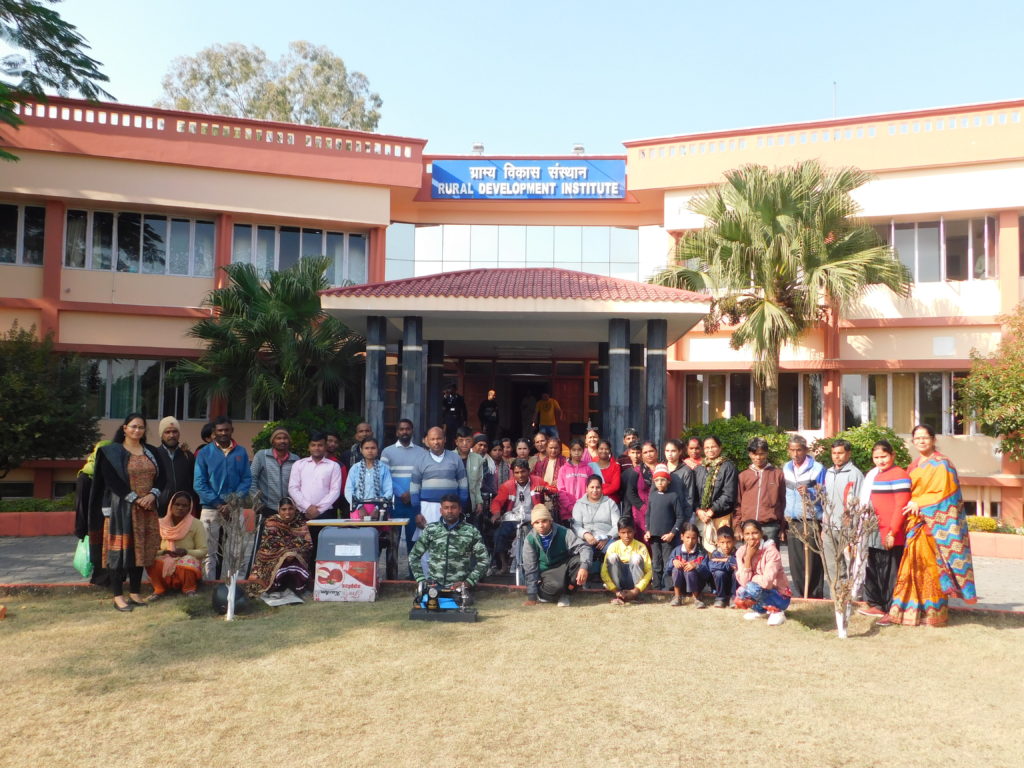RDI works to create inclusive and sustainable growth and development for people with disabilities, starting from the ground up. People with disabilities can have a variety of impairments, such as visual, speech, and hearing impairments, intellectual impairments, multiple impairments, psychological impairments, physical impairments, and so on. RDI supports people with disabilities by helping them to get the necessary identification by providing them with disability certificates/UIDIDs from government departments, connecting them to various social protection programs, providing assistive devices and surgical intervention according to their needs, providing income generation assistance, and supporting and connecting them to various organizations, such as the National Career Service Centre (NCSC).
On the 3rd of December of this year, RDI marked International People with Disabilities Day with the participation of people with disabilities, a group of medical experts, and staff members. The Director General Academics, Swami Rama Himalayan University and Secretary of Himalayan Institute Hospital Trust, Dr. Vijendra Chauhan stressed that organizations must make the day a people’s movement and involve everyone to ensure their contribution to the cause. He also said that people with disabilities have many talents that can make their future better and more sustainable, rather than focusing on one weakness. Dr. B. P. Kalra, Senior Paediatric Specialist at the Himalayan Hospital, said that since 2019, they have been working with children and their families with learning disabilities and found that they are facing many challenges in achieving academic success. He commended the efforts of RDI to continue the learning disability clinic at the hospital. Dr. Ashwani Bhatt from the Neurology Department shared that learning disability requires a lot of support and time from the family. He added that without proper screening and counselling, families are often unaware of the process. Therefore the family members have to be involved in the learning disability treatment process. Dr. Priya Ranjan Avinash from the Psychiatric Department said that the mental stress faced by the child and their family over a long period has turned into a chronic disorder. Due to this, families tend to focus more on psychological problems rather than learning disabilities.
Dr. Rajeev Bijalwan, Deputy Directory RDI stressed the need to involve the family members in mainstreaming people with disability. “The need of the hour is to involve the parents and relatives in income generation activities,” said Dr. Bijalwan. “This year, the RDI team stepped up efforts to involve more people with disability, both youth and adults. Many youths participated in the Career Fairs organised by National Career Service Center Dehradun, where they got employment opportunities in different multinational companies. Unfortunately, most of the youth were unable to join as their parents did not let them move outside the home,” he added. He said that we should understand the needs of people with disability and empower their parents and relatives to train, organise and empower them so that they can live their life independently. Activities of Daily Living (ADL) training can play a key role in addressing this issue.
The program coordinator, Mrs. Neelam Pandey, presented the work of RDI in the field of community-based rehabilitation. She mentioned that RDI is working to provide inclusive health information to disabled people. She also presented the inclusive menstrual hygiene management training kit in braille language, sign language and video.
The Chief Guest distributed scholarships and assistive devices such as tricycles and sewing machines as well as seed money for the small entrepreneur program on the occasion. Community supporters or volunteers were also recognized and awarded during the event.

